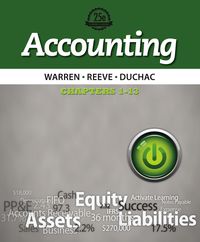1. Calculate the contribution per mile and total annual contribution associated with accepting FHPs proposal (use 52-weeks/year in your calculations).
2. Assume Over-lands management chooses to invest in one additional truck and trailer that can serve the needs of FHP (at least initially). Assume the annual incremental fixed costs associated with acquiring the additional equipment is $50,000. Further, FHP would agree to pay $2.20/mile (total) if Over-land would sign a five-year contract. What is the annual number of miles required for Over-land to break event, assuming the company adds one truck and trailer? What is the expected annual increase in profitability from the FHP contract? (Use 52 weeks/year in your calculations)
3. Over-land has business relationships with independent contractors, though founder Alan James is reluctant to use them. Another possibility for expanding capacity is to outsource the miles requested by FHP. One of Over-land's most reliable independent contractors has quoted a rate of $1.65 per mile. Assume FHP would agree to pay $2.20 per mile if Over-land would sign a five-year contract. Further, assume Over-land would incur incremental fixed costs of $20,000 annually. These costs would include insurance, rental trailers, certain permits, salaries and benefits of garage maintenance, and office salaries such as billing. How many annual miles are required for Overland to break even if the miles are outsourced? What is the expected annual increase in profitability from the FHP contract?


THE PROPOSAL AND RELATED ISSUES Management at FHP has asked Over-land to consider adding two dry van loads per week; each load would require 1,500 round-trip miles. Because FHP is a long-term client with a strong financial position, the company's management has asked, for a very favorable rate of $2.15 per mile including FSC and all miscellaneous fees. Roger believes the potential volume of freight from FHP can be used to grow Over-land's business and profitability. There is also risk associated with not taking the new lines. If Over-land does not accept the new routes, another trucking line will, thus building loyalty with FHP. Exhibit 1 Income from Operations (All financial information in the case has been scaled and disguised for educational purposes.) Over-land Trucking and Freight Income from Operations For the year ending December 31, 2013 Revenue Line Haul Fuel Surcharge Miscellaneous Total Revenue EYE 12/31/2013 $20,925,280 4,950,160 450.120 $26,325,560 Per Mile $1.86 0.44 0.04 $2.34 Variable Expenses Insurance Fuel Oil Lubricants 675,120 8,775,190 112,700 112,550 787,630 4,950,160 255.120 0.06 0.78 0.01 0.01 Tolls 0.07 Parts and Small Tools Hourly Wages: Drivers Trailer Pool Expense Total Variable 0.44 0.02 1.39 15,668,470 0.01 Fixed Expenses Insurance General Liability Physical Damage Workers Compensation Health Insurance Security Depreciation Salaries, Benefits (Garage) Salaries, Benefits (Office) Bad Debt Expense Permits Rental Equipment Payroll Taxes Accounting Fees, Supplies, Computer Maintenance Miscellaneous Total Fixed 112,620 225,010 226,000 224,500 111,750 2,137,500 675,000 1,012,520 113,500 111,520 1,013,000 562,500 112,350 0.02 0.02 0.02 0.01 0.19 0.06 0.09 0.01 0.01 0.09 0.05 0.01 337,510 6,975,280 0.03 0.62 Income from Operations $3,681,810 $0.33 Note: Per mile values are based on 11,250,000 miles and have been rounded to two decimal places. THE PROPOSAL AND RELATED ISSUES Management at FHP has asked Over-land to consider adding two dry van loads per week; each load would require 1,500 round-trip miles. Because FHP is a long-term client with a strong financial position, the company's management has asked, for a very favorable rate of $2.15 per mile including FSC and all miscellaneous fees. Roger believes the potential volume of freight from FHP can be used to grow Over-land's business and profitability. There is also risk associated with not taking the new lines. If Over-land does not accept the new routes, another trucking line will, thus building loyalty with FHP. Exhibit 1 Income from Operations (All financial information in the case has been scaled and disguised for educational purposes.) Over-land Trucking and Freight Income from Operations For the year ending December 31, 2013 Revenue Line Haul Fuel Surcharge Miscellaneous Total Revenue EYE 12/31/2013 $20,925,280 4,950,160 450.120 $26,325,560 Per Mile $1.86 0.44 0.04 $2.34 Variable Expenses Insurance Fuel Oil Lubricants 675,120 8,775,190 112,700 112,550 787,630 4,950,160 255.120 0.06 0.78 0.01 0.01 Tolls 0.07 Parts and Small Tools Hourly Wages: Drivers Trailer Pool Expense Total Variable 0.44 0.02 1.39 15,668,470 0.01 Fixed Expenses Insurance General Liability Physical Damage Workers Compensation Health Insurance Security Depreciation Salaries, Benefits (Garage) Salaries, Benefits (Office) Bad Debt Expense Permits Rental Equipment Payroll Taxes Accounting Fees, Supplies, Computer Maintenance Miscellaneous Total Fixed 112,620 225,010 226,000 224,500 111,750 2,137,500 675,000 1,012,520 113,500 111,520 1,013,000 562,500 112,350 0.02 0.02 0.02 0.01 0.19 0.06 0.09 0.01 0.01 0.09 0.05 0.01 337,510 6,975,280 0.03 0.62 Income from Operations $3,681,810 $0.33 Note: Per mile values are based on 11,250,000 miles and have been rounded to two decimal places








